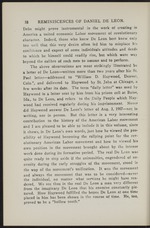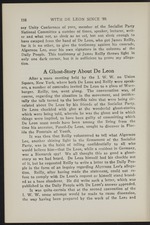| 1 |
 |
“...individuals attitudes and deeds
to which he himself could readily rise, but which were way
beyond the calibre of such men to assume and to perform.
The above observations are most strikingly illustrated by
a letter of De Leonwritten more than two years after his St.
Paul letteraddressed to William D. Haywood, Denver,
Colo., and delivered to Haywood by St. John at Chicago, a
few weeks after its date. The term "daily letter was used by
Haywood in a letter sent by him from his prison cell at Boise,
Ida., to De Leon, and refers to the Daily People which Hay-
wood had received regularly during his imprisonment. Never
did Haywood answer De Leons letter of Aug. 3, 1907not in
writing, nor in person. But this letter is a very interesting
contribution to the history of the .American Labor movement
and I am pleased to be able to include it in this volume, since
it shows, in De Leons own words, just how he viewed the pos-
sibility of Haywood becoming the rallying point for the rev-
olutionary American...”
|
|
| 2 |
 |
“...conversation was, of
course, regarding the situation in the movement, and inciden-
tally the talk turned to the horrible tales that were being cir-
culated about De Leon by his friends of the Socialist Party.
De Leon chuckled with glee at the wonderful ghost-stones
which were being told, wherein he was the ghost and in which
things were implied, to have been guilty of committing which
De Leon must needs have been among the living from the
time his ancestor, Ponc.De Leon, sought to discover in Flor-
ida the Fountain of Youth.
It was then that Reilly volunteered to tell what Algernon
Lee, another shining light in the firmament of the Socialist
Party, was in the habit of telling confidentially to all who
would believe himthat De Leon, while a resident in Germany,
was a Bismarck spy! We all thought this as good a ghost-
story as we had heard. De Leon himself had his chuckle out
of it, but he requested Reilly to write a letter to the Daily Peo-
ple in the form of an inquiry regarding Algernon Lees...”
|
|
